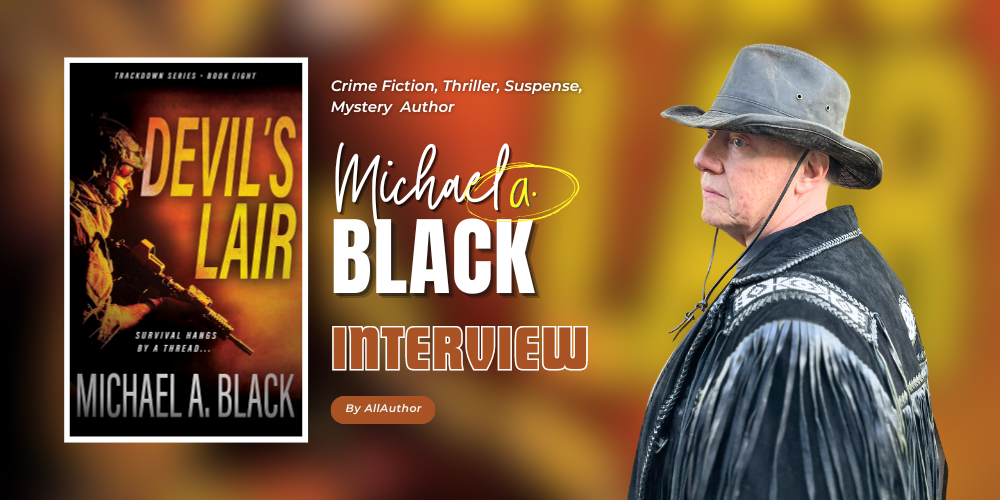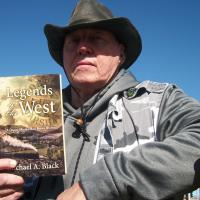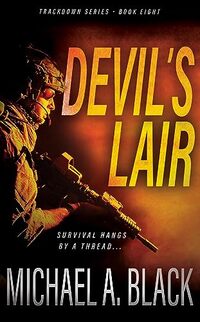Genre:
Crime Fiction Thriller Suspense Mystery- Country: United States of America
- Books: 1
- Profession: Retired Cop, teacher, author
- Member Since: May 2024
- Profile Views: 1,222
- Followers: 36
- VISIT AUTHOR: Amazon,
After a long career in law enforcement, during which time I wrote several books (all traditionally published), I retired and began writing full time. I also teach creative writing at a junior college. I've written over 50 books in numerous genres including mystery, thriller, westerns, non fiction, and sci-fi. I've also written the Executioner series under the name Don Pendleton. My other pseudonym is A.W. Hart for Wolfpack Publishing. I'm a board member of the Public Safety Writers Association and organize and run their annual conference in Las Vegas, Nevada. I enjoy many things, not the least of which is helping other writers.
Michael a. Black's Books
Stay in the loop on books by Michael a. Black. See upcoming and best-selling books by the author here. You'll also find the deals on books by Michael a. Black.
** Please note that the information or price displayed here may not be the updated. Make sure to double-check the latest book price before buying books.
** Also, there might be other books by Michael a. Black not listed on AllAuthor.
| Book |
|---|
Michael A. Black's Awards and Achievements
-

Best Original Novel Scribe Award
2018 award
Michael A. Black has earned excellence awards over time. Here is the glimpse of the accolades clinched by the author.
Michael a. Black Interview On 02, Sep 2024
 "After a distinguished career in law enforcement, Michael A. Black transitioned to full-time writing, bringing a wealth of real-life experience to his work. With over 50 books spanning mystery, thriller, westerns, non-fiction, and sci-fi, he is a versatile and prolific author. He is passionate about mentoring fellow writers and sharing his knowledge."
"After a distinguished career in law enforcement, Michael A. Black transitioned to full-time writing, bringing a wealth of real-life experience to his work. With over 50 books spanning mystery, thriller, westerns, non-fiction, and sci-fi, he is a versatile and prolific author. He is passionate about mentoring fellow writers and sharing his knowledge."
Actually, I was a writer long before I became a cop. I wrote my first short story in the 6th grade. I kept badgering the teacher to let me write one and finally she relented. "Read it before the class on Monday," she told me one fateful Friday afternoon. I was ecstatic until it dawned on me I had no idea what to write about. I labored all weekend and finally scribbled out a tale about a crooked cop and a private detective. (I know that sound ironic at this stage of the game, right?) Well, I read it in front of the class on Monday and they sat in silence until one mean kid threw and eraser and hit me in the head. Then everybody laughed. The teacher gave me a D and scrawled "Poor work" across the first page in red ink. She told me never to do it again. I look back on this experience with extreme fondness now because, ironically, it foreshadowed my entire writing career that was to come. I got my first assignment, my first deadline, my first bout with writer's block, and my first rejection all in the space of about three days. I kept on writing and eventually got better at it. Being a police officer exposed me to many different experiences and people. I became a matter of creating my own world where I could tell the tales in an entertaining fashion.
With over 50 books in various genres, how do you approach switching between different genres like mystery, thriller, westerns, non-fiction, and sci-fi?I've always been an eclectic reader. As a child I read Doyle's Sherlock Holmes stories and H.G. Wells' The Time Machine. I've always seen the value in different types of stories, and it was my goal to be published in as many different genres as possible. Good writing is good writing no matter what kind of story you're telling.
What was the experience of writing the Executioner series under the name Don Pendleton like? How did it differ from your other works?I was honored to be able to write the Executioner. Don Pendleton started the series in 1969 with The War Against the Mafia. Mack Bolan, the Executioner, was an urban vigilante in the early days. Through the years he sort of morphed into the American James Bond. I had to audition for the writing assignment by writing a proposed story synopsis and some sample chapters. There was a character bible that had to be followed, and I read a bunch of books in the series to get familiar with the style. The editors at Gold Eagle (Harlequin) liked what I’d written well enough to okay the project, and I penned my first Executioner book, Sleeping Dragons. After that I was given more contracts. I wrote eleven of them in total. It’s ironic because way back in the day, when I was in Basic Training in the Army, the guy in the next bunk was reading one of the original Executioner novels. I asked him if it was good, and he said it was “great.” He offered to give it to me when he was done reading, but we shipped out and I never saw him or the book again. Then suddenly, all these years later, I found myself writing the series.
Can you share some insights into your writing process? Do you have a particular routine or set of practices that you follow?I’m a firm believer in outlining. I get an idea and start playing “what if?” in my head. I jot down notes from time to time, and pretty soon I have a “first draft” written. From there, I go about refining it and rewriting until I’m satisfied and then begin. I write in chronological order, but sometimes skip ahead if a scene will come to mind. I usually change or modify my outline three to four times during the course of writing a novel. Once it’s done, I let it sit for a bit (usually a few days, depending on the deadline or time constraints) and then begin the revision. As Roald Dahl once said, “Good writing is rewriting.”
As someone who teaches creative writing at a junior college, what advice do you give your students about the craft of writing and the publishing industry?Getting published is a long and difficult process. I believe it was Ray Bradbury who said you have to write a million words before you find your voice. I’m not sure if I wrote that many, but it was a long and difficult journey. I try to give my students a realistic idea of what it’s like. Trying to break into publishing is very difficult, and not everyone will emerge from one of my classes a published author. (That said, I have had a few students who did get published.) Basically, I stress the joy of writing and putting your words and thoughts down on paper. When I was in grad school one of my professors once said to the class, “Not all of us will become published authors, but we’re all writers.”
You've written under different pseudonyms, including A.W. Hart. How do you decide when to use a pseudonym, and what are the benefits and challenges of doing so?My alter ego A.W. Hart is an Amazon Bestseller, so I owe him a lot. It’s what they call a “house name” in that several writers write books under that name. The same held for Don Pendleton. Usually it’s a situation of “write for hire,” where an editor from a specific publisher comes up with an idea for a series and then hires several writers to knock out some books for the series in a short period of time. There’s usually a character bible with restrictions and an overall story arc presented to the writers, who then write novels that can be fitted into the series. I’ve done a few of these as A.W. Hart, including the Gunslinger series, which I ended up finishing off, and Concho: Border Blood, about a modern-day Texas Ranger. It’s a challenging process, but I always try to give it my best effort no matter what name I’m writing under.
What role does your background in law enforcement play in your book, “Devil's Lair”, especially in the mystery and thriller genres?Devil’s Lair is the eighth book in my Trackdown series. The series began with Devil’s Dance in which a disgraced Army Ranger, Steve Wolf, is released from prison after serving time for a war crime he did not commit. He’s then recruited by his former mentor to be a bail enforcement agent. (That’s a bounty hunter in less formal terms.) As an ex-con, Wolf’s prohibited from carrying a gun, and wants to hire a lawyer to try and clear his name. I came across a few actual bounty hunters in my days as a cop, and I was familiar with how the court system works. Wolf is an underdog fighting against long odds, but he’s “army tough” and keeps going.
Can you describe your involvement with the Public Safety Writers Association and what it's like to organize and run their annual conference?The PSWA is a great organization that’s composed of all kinds of fabulous people. Many have backgrounds in public safety (law enforcement, fire fighting, federal agents, and military) but a lot of members have no experience in the field. They simply want to write about some aspect of public safety, be it mystery, police procedural, thriller, etc. We hold our annual conference each year in Las Vegas and it’s always a great time. It’s a challenge to set it up, but we are a very inclusive organization and the members make it worthwhile. It’s been said that you might arrive at your first PSWA Conference a stranger, but you won’t leave as one. We start off with a writer’s workshop, have panels of experts, featured speakers, a writing competition award ceremony, and great food. Check out the PSWA website for details. Everybody’s welcome.
How do you stay inspired and motivated to keep writing, especially with such a prolific output?As I mentioned before, I’ve dreamed of being a writer all my life. Motivation for me is to be able to tell the stories that are floating around in my head in a polished and entertaining fashion. I’ve been very fortunate to see my dreams come true.
What do you enjoy most about helping other writers, and can you share a memorable experience where you made a significant impact on someone's writing journey?I remember the early days when I’d come home after working a long midnight shift and sit down to crank out a couple pages before getting some sleep. (It’s my standard goal to write at least two pages a day.) I must have gone through ten years of getting rejection slips before I finally sold that first short story. I’ll never forget that feeling, nor will I forget the published writers who time out to encourage me along the way. I’ve been lucky enough to have some great mentors, and their help, advice, and encouragement kept me going when things seemed hopeless. I made up my mind that if I ever did make it as a writer, I’d do the same. Through the years I’ve helped numerous other writers with advice and critiques. It’s paid off on several occasions. I never kept count of the writers I helped get published, but I imagine it’s quite a few.
What are some of the key lessons you've learned from your long and varied writing career that you think are crucial for aspiring writers to understand?The most basic one is you have to take the time to learn the craft of writing. That means putting your butt in the chair and cranking out the words. You need feedback on your writing no matter what stage you’re at, and nobody gets it perfect the first time. Good writing is rewriting. I stress that in all of my classes.
Can you talk about any challenges you faced in the transition from law enforcement to writing full-time and how you overcame them?I had a long career as a cop, and it was gratifying that along the way I was able to help a lot of people. Police work is demanding, and sometimes you live on adrenaline. The excitement and danger are always lurking around the next dark corner. At some point you realize it’s time to step down and let the next generation take over. I was blessed that I emerged relatively healthy and able to continue my writing career. I became a published writer while I was still working in law enforcement, so it was a natural step to devote myself to writing when I retired from the PD.
Which of your books or series are you most proud of and why?I’m proud of all of them. I always say that my favorite book is the one I’m working on now. I’ve won numerous awards throughout my writing career, but trying to single out one particular book or series would be difficult for me. My Ron Shade PI series was my first, so it’s special to me. I dealt with a lot of police procedural issues in my Leal and Hart series. With the Gunslinger series as A.W. Hart, I was able to pay homage to the western genre, and with the Trackdown series I’ve been able to touch on a lot of problems of returning veterans. I’ve also done a lot of standalones, the most recent of which is Where Legends Lie. I’m particularly proud of that one, which some people have said is my best book. It’s the tale of two stories, one set in 1913 with an army vet returning after enduring bloody combat in the Philippines, and the other dealing with an Old West shootout that occurred thirty years prior in the 1880’s. The two stories are told in tandem, and then coalesce at the end of the book. I was also able to include famous writer Ambrose Bierce in Where Legends Lie. I read his stories back in high school and always admired his work.
How do you balance writing across different genres with maintaining a cohesive personal brand as an author?I’ve always felt that good writing was good writing, regardless of the genre. While it’s certainly true that when writing in the various genres a writer has to be cognizant of the expectations of each genre’s particular audience, my goal is to always write in an entertaining manner. Whenever someone picks up one of the books I’ve written, I want them to know that I’ve put everything into making it the best it could be.
When did you join AllAuthor? What has your experience been like?I’m relatively new to AllAuthor and have been very impressed with the organization thus far. I’m very grateful for the opportunity to do this interview and I hope it proves beneficial and entertaining for your audience. Thanks for having me.
Ask Michael a. Black a Question
Have brimming questions to ask author Michael a. Black? Ask whatever you like, but keep it appropriate.
** Please note that unanswered questions will not appear on the page. Refrain from posting promotional messages.
Contact Michael a. Black
The author, a good book and you! Contact Michael a. Black here.
** Please refrain from spamming and don’t bombard the author with promotional mails/messages. Your IP/Email address may be blocked if found doing so.
Contact Author on:


